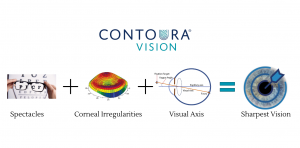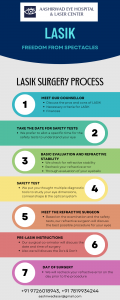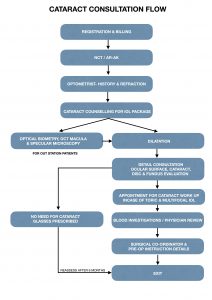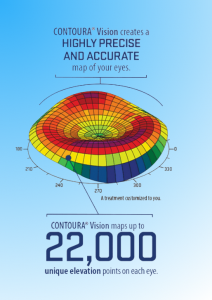REFACTIVE SURGERY- LASIK CLINIC
Aashirwad eye hospital is the best option for your laser eye surgery (LASIK) because it offers customized laser vision correction performed by skilled and well-known surgeons, as well as advanced diagnostic tools, thorough preoperative evaluations, a state-of-the-art OT complex, and meticulous postoperative care. We have more than 15 years of expertise handling challenging cases & complex corneas.
CONTOURA VISION LASIK SURGERY NOW AVAILABLE AT
AASHIRWAD EYE HOSPITAL , NAVSARI
|
Did you know that 43% of visual impairments are caused by refractive errors, and that 750,000 people choose laser vision correction last year with a 96-98 percent success rate? When the parallel light beams from infinity do not concentrate in the retina’s light-sensitive layer, this is known as a refractive error. This might be brought on by changes in the eyeball’s length (longer or shorter), the cornea’s shape, or the lens’s rigidity as we age. |
Refractive surgery (LASIK) is an elective cosmetic procedure intended to correct refractive error and remove the patient from the need for eyeglasses & provide spectacle free life. It usually takes 5 to 10 minutes per eye and is done as an outpatient treatment.


CONTOURA VISION LASIK
The topolyser, a diagnostic tool, is used in Contoura Vision, the newest and most sophisticated technology to improve vision. It gives an extremely accurate mapping of the eye with 22,000 different elevation points for each eye. It can detect corneal abnormalities and generates a unique treatment profile for each eye. It was introduced in 2016 and received US FDA approval. The Contoura platform is the only one in the world created to treat on your visual axis, giving you the clearest eyesight possible whereas all other laser platforms treat on your pupillary axis.
Are you the right candidate?
Let’s discuss your suitability and whether laser vision correction is the appropriate choice for you. The kind and degree of refractive error you have, together with the thickness and curvature of your cornea, will determine if you are a candidate for refractive surgery. You must be at least 18 years old, free from dry eye disease, have stable vision for at least 6 months prior to surgery, and be neither pregnant nor nursing. Include any further medical issues you may have and any drugs you may be taking.


Various treatment options are available based on your refractive error, eyeball condition and your lifestyle.
- LASIK, the most popular refractive technique, LASIK (Laser Assisted in Situ Keratomileusis), involves reshaping the cornea using a laser. To correct your vision, your surgeon first makes an ultra thin flap on the surface of the eye, through which he then uses an excimer laser to reshape your cornea. This flap is then returned to its original position, and your eyes heal on their own. For laser vision correction, it is regarded as the most efficient, exact, predictable, safe, and patient-friendly choice. It is suitable for patients with mild to moderate amount of myopia, hyperopia and astigmatism.
- PRK or TransPRK, also known as transepithelial photorefractive keratectomy, is a sophisticated touch-free laser refractive procedure that includes removing the cornea’s epithelium. It eliminates dependence on contact lenses and spectacles and is used to cure myopia (nearsightedness), hyperopia (farsightedness), and astigmatism. Many people prefer it over LASIK surgery because it reduces the possibility of flap issues and may be used on those with thin corneas and extreme myopia. It is one of the fastest methods for correcting eyesight. Certain kinds of jobs accept PRK in their job criteria because of its long term safety profile.
- Implantable Contact Lenses (ICL), is a cutting-edge refractive error treatment that involves implanting a contact lens within the eye to correct refractive error and improve vision. Collagen, a substance that is very biocompatible, is used to make the lens, which is attached in front of the natural lens. Similar to how glasses or contact lenses work, it works to appropriately focus light back onto the retina. ICL surgery has a track record of success with over 10 million extremely delighted patients globally in the last 20 years.
Patient information leaflets to download –
[helpie_faq group_id=’51’/]


